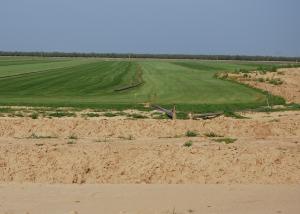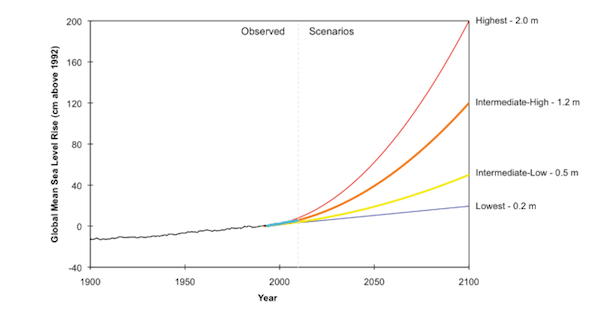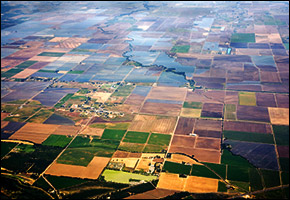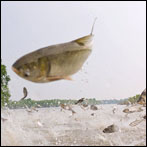Peter Gleick: Misusing California Water Numbers for Political Purposes: Jobs, Fish, and Lies
Anyone who pays attention to water in California knows that the state is just getting over (we hope) a serious three-year drought. And anyone who pays attention to water in California knows that the drought led to very serious political posturing, arguing, and drama, especially in the Central Valley.
Indeed, the drought became a cause celebre for some on the right, Central Valley Tea Partiers, and talk show conservatives, who used it as an excuse to launch a full-scale assault on the environment of the Sacramento-San Joaquin Delta, legal decisions to restore small amounts of water to dried-up rivers, and the Endangered Species Act. Late last summer, Sean Hannity came and held a rally to argue that the drought was caused by politics, not weather, that tens of thousands of farm jobs had been lost because of environmental restrictions, and that the agricultural communities of the Central Valley were being destroyed by efforts to save fish, especially a small fish called the Delta Smelt, from extinction. The problem, they said over and over, was we had to choose “fish versus jobs.”
Most of what Hannity and other speakers at that rally said was wrong or misleading, but the two most important pieces picked up and repeated over and over by the media were the arguments that (1) the drought was caused by human decisions, rather than the weather (doubly ironic since these same groups consistently argue that humans cannot be causing climate change), and (2) it had led to massive job losses in the agricultural sector. The two major Republican candidates for Senate and Governor in California continue to use these arguments in their water policy pronouncements.
The problem is that both claims are false. It was apparent, even then, that these arguments were at best partial truths twisted around a core of lies, and I wrote a previous SFGate post about this in August 2009. But new evidence now shows clearly how false those claims were.
What’s the real story? A superb article written by reporter Mike Taugher, pulls it all together.
In early 2009, Professor Richard Howitt, a UC Davis agricultural economist, tried to predict the economic impact the natural drought and new legal restrictions on Delta pumping would have on San Joaquin Valley farms. His earliest estimate was that these water problems might cost California around 95,000 jobs. Around the same time, Dr. Jeffrey Michael, director of the Business Forecasting Center at the University of Pacific did a separate estimate, and came up with a far lower number. After the two of them began comparing notes, assumptions, and data, Dr. Howitt revised his figure downward several times. His first estimate, however, was like throwing red meat to lions, and Hannity and others picked it up and, to this day, continue to use it. A jobs plan that is part of Meg Whitman’s gubernatorial campaign is still arguing that the drought and Delta pumping restrictions might have cost California 95,000 jobs. Senate candidate Carly Fiorina puts the number at 40,000 using other outdated and inaccurate numbers.
Howitt and Michaels, in an open and remarkable academic collaboration, have gotten together and produced a joint analysis. Their conclusions?
The early estimates of lost jobs were far, far too high. They now say that between 5,500 and 7,500 jobs were lost due to the water availability constraints in the San Joaquin Valley last year, and equally importantly, most of the blame goes to the weather, NOT to environmental protections. Indeed, while some individual farmers and water districts with junior water rights suffered serious impacts, the agricultural sector of the state as a whole, has had pretty good years even with the drought, because of water transfers, temporary use of groundwater, improved efficiency, high prices for some crops, and other adjustments.
Water Numbers: 1,400 to 3,000 jobs (not 95,000 or 40,000). What do the economists now think the actual impacts were? One of the economists put the job loss attributable to environmental protections at 1,400 jobs; the other (using different assumptions and estimates) put the figure closer to 3,000 jobs. Not 95,000. Not 40,000. In comparison, the economic recession cost the region 76,000 construction-related jobs.

Even more ironically, taking water from the environment and the fish costs jobs too, though we’ve traditionally ignored or failed to estimate these costs. Economist Michaels estimates that 1,800 jobs have been lost by the commercial salmon industry due to the ecological destruction of the fisheries because of water withdrawals and other problems in the Delta — similar to the number of jobs lost to farmers. That shows some of the potential benefits of delivering a little water to the environment to restore healthy fisheries.
As for the politicians, will they change their numbers, websites, and rhetoric? Will they step up for the environment and the salmon fishermen? Professor Howitt said in an email to reporter Mike Taugher, “Yes, it’s a problem when candidates don’t use the most recent and accurate figures… I have tried to correct this, but this combined report should help put some of the outdated values to rest.”
Do certain politicians and talk show hosts care about facts, even when they are inconvenient? Will they correct their positions, or will incorrect numbers continue to be used to drive a political agenda? We’ll see.
Peter Gleick
Previous posts can be found here.











Politicians can hardly care about any facts because not many of facts are convenient for them. As we voted so we have our politicians.
The equation should look like this: if we have higher employment we can do more for environmental protections.
Just to stress the fact that indeed, water resources experts and developpers should more and more put an emphasis on the environmental flow that must be reserved to protect the environmental resources in every large water infrastructures design. I am also surprised by your discussion because in Africa where I live, the fashion word now is “environmental protection” and I notice that there are also some skeptics among the western community on that topic. I can also see the importance of countries’ water footprint assessment which give us the water consumption for economic activities. water is unavoidable.